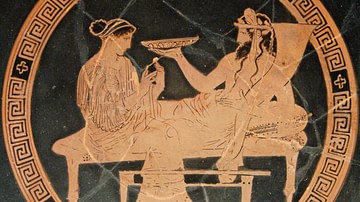Search Definitions
Browse Content (p. 232)

Definition
Brasidas
Brasidas (d. 422 BCE) was an enterprising and successful Spartan general during the early years of the second Peloponnesian War (431-404 BCE) between Athens and Sparta. His successes against the Athenians tilted the balance of the war back...

Definition
Emperor Xuanzong of Tang
Xuanzong (birth name, Li Longji, l. 685-762 CE, r. 712-756 CE) was the 7th emperor of the Tang Dynasty of China, whose domestic and foreign policies established the Tang Dynasty as the Golden Age in Chinese history. Many of the most important...

Definition
Ostracism - Political Exclusion in Ancient Athens
Ostracism was a political process used in 5th-century BCE Athens whereby those individuals considered too powerful or dangerous to the city were exiled for 10 years by popular vote. Some of the greatest names in Greek history fell victim...

Definition
Egyptian Book of the Dead
The Egyptian Book of the Dead is a collection of spells which enable the soul of the deceased to navigate the afterlife. The famous title was given the work by western scholars; the actual title would translate as The Book of Coming Forth...

Definition
Persephone
Persephone (aka Kore) was the Greek goddess of agriculture and vegetation, especially grain, and the wife of Hades, the ruler of the Underworld. Persephone was an important element of the Eleusinian Mysteries and the Thesmophoria festival...

Definition
Kofun Period
Following the Yayoi Period of Japan when farming and metalworking techniques were introduced from mainland Asia was the Kofun Period (c. 250 CE - 538 CE) where the religion of Shinto emerges from the beliefs of previous eras and the Yamato...

Definition
Demetrius I of Macedon
Demetrius I of Macedon, also known as Demetrios Poliorcetes, the 'Besieger' (c. 336 - c. 282 BCE), was a Macedonian king who, along with his father Antigonus I, fought for control of Alexander the Great's empire in the 'Successor Wars'. After...

Definition
Epaminondas
Epaminondas (or Epameinondas, c. 420 - 362 BCE) was a Theban general who famously defeated Sparta at the Battle of Leuctra in 371 BCE. The daring and brilliant pre-meditated tactics of Epaminondas earned a decisive victory over Sparta and...

Definition
Serket
Serket (also known as Serqet, Selkis, and Selket) is an Egyptian goddess of protection associated with the scorpion. She was worshipped widely in Lower Egypt as a great Mother Goddess in the Predynastic Period (c. 6000- c. 3150 BCE) and so...

Definition
First Triumvirate
The First Triumvirate of ancient Rome was an uneasy alliance between the three titans Julius Caesar, Pompey, and Crassus which, from 60 BCE until 53 BCE, dominated the politics of the Roman Republic. Alliances have always been a part of history...